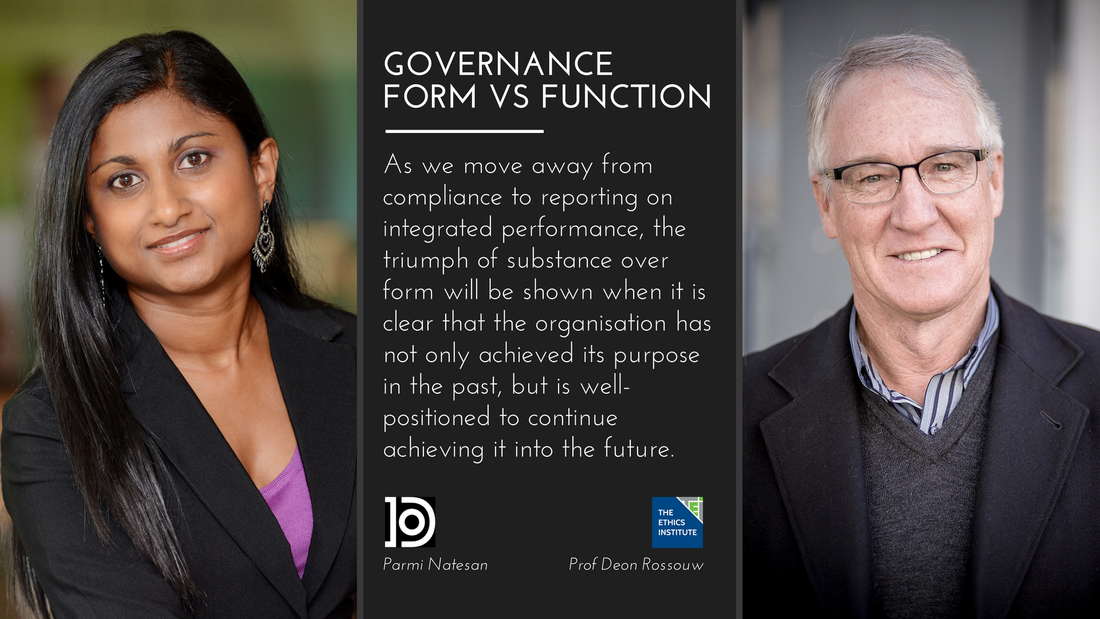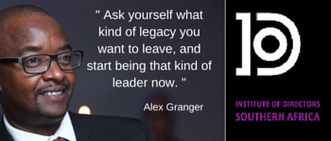|
One of the most persistent challenges relating to governance is the tendency to focus on form rather than substance. In line with King IV, it’s time finally to accept that governance is not an end in itself, but a tool for delivering outcomes, says Parmi Natesan, Executive: Centre for Corporate Governance at the Institute of Directors in Southern Africa (IoDSA) and Professor Deon Rossouw, CEO of The Ethics Institute.
“Organisations only exist in order to deliver on their purpose and, similarly, governance only exists in order to help them do that,” says Professor Rossouw. “Governance got a bad name because people persist in seeing it in terms of compliance, structures and policies. Of course, these things are important only as tools to help deliver outcomes.” This focus on outcomes is very much a feature of King IV, which was designed to link governance practices with four governance outcomes, notes Ms Natesan. “The critical point is that structures need humans to give them life, to use them to deliver the desired results. Governing bodies must therefore ensure that the governance structures are indeed achieving the desired governance outcomes,” she says. King IV identified four governance outcomes: an ethical culture, good performance, effective control and legitimacy. Boards can therefore measure whether the structures they have put in place, and the way they are being used, are effective by measuring the extent to which these outcomes are being attained. Clearly, then, the personal qualities and actions of the members of the governing body are critical in ensuring that the governance objectives are achieved, that substance follows form. King IV retained the four cardinal values that should underpin good governance—responsibility, accountability, fairness and transparency (RAFT)—but added two further ones: integrity and competence. This recognises that governance structures will only be valuable if they are used by people who are prepared to put their own interests aside and act ethically in the best interests of the organisation, beyond mere legal compliance, and who have the requisite knowledge both of the organisation and the industry in which it operates. “It is important to recognise that governing-body members have to cultivate these characteristics in order to make them instinctual,” Professor Rossouw argues. “People aren’t born with integrity, competence or any of the others, they have to be nurtured.” As with any enterprise involving human behaviour, moving from form to substance is no easy task. Some guidelines for assisting are: • Select members of the governing body carefully. It all begins with selection, says Professor Rossouw, so nomination committees must actively seek people with these cardinal virtues. • Orient new members properly. Once selected, it is vital that new members of the governing body are properly educated about what their new role entails, and continually reminded that they are there primarily to serve the best interests of the organisation, not those of any particular stakeholder. • Structure meetings carefully to ensure that members have the right types of conversation, and do not confine themselves to ticking the boxes. Courage becomes important here—not just moral courage but also the courage to take the right risks. • Hold members of the governing body accountable. There are several elements to this. First, peer pressure must be harnessed to create a positive atmosphere in which members continually assess their own performance and that of their fellow members. Courage will also be at a premium here but it is equally important the board is truly diverse, says Ms Natesan. This is needed to overcome the “buddy mentality” in addition to measures like gender, race and age. At the same time, though, it must be recognised that self-appraisal is no substitute for the stakeholders assessment of the extent to which the four governance outcomes have been achieved. Ms Natesan stresses that there is not necessarily more unethical behaviour now, just that it is more visible—something she sees as positive. She argues that, going forward, how governing bodies disclose about governance and its results will become more and more important. The disclosure must convince stakeholders not just that the right governance structures are in place, but that they are delivering results, she says. Looking forward, adds Professor Rossouw, as we move away from compliance to reporting on integrated performance, the triumph of substance over form will be shown when it is clear that the organisation has not only achieved its purpose in the past, but is well-positioned to continue achieving it into the future. ENDS MEDIA CONTACT: Juanita Vorster, 079 523 8374, [email protected], www.atthatpoint.co.za For more information on the IoDSA please visit: Website: www.iodsa.co.za Twitter: @The_IoDSA LinkedIn: Institute of Directors in Southern Africa Company Page
0 Comments
As the FIFA scandal swirls into the firepool at Nkandla, and the Auditor-General reports another year of astronomical “fruitless and wasteful expenditure” by the country’s municipalities, the value of strong and ethical leadership becomes yet clearer. In business, too, it’s well established that the quality of an organisation’s leadership will affect its performance dramatically.
In other words, Alex Granger’s topic of Incredible Leadership was well-chosen for the lunch that followed the IoDSA’s recent AGM. Granger opened his presentation by observing that incredible leadership had to be credible. Leaders cannot just mouth fine words and sentiments—they have to embody them. Employees (and people generally) want to trust their leaders, but that trust has to be earned. Granger outlined some of the warning signs that an organisation’s leadership might be falling short of incredible. Among them he listed fear of facing up the challenges involved in fulfilling the organisation’s mandate, a lack of attention to detail, tension in the organisation, and a tendency to be reactive rather than proactive. Superman not needed He went on to identify some of the characteristics of the incredible leader. The first is that he or she should be “flawsome”; that is, both “awesome” and “flawed”. “Leaders need to be less ‘super’ and more ‘human’,” Granger said, noting that imperfect leaders attract loyalty. However, they do need to be consistent: what they say and what they do have to align. And while they need to recognise that they can’t (and shouldn’t) tell everybody everything, what they communicate should be truthful. Another important leadership quality is the ability (and willingness) to build personal relationships. This is the only way to build trustworthiness, and we can see all around us the lack of care and empathy shown by leaders, from the ward councillor living in a gated community to the union leader insulated from his constituents by a phalanx of guards. “If people are looked after well, they will look after the organisation,” Granger said. “Never forget the human element, and don’t treat your employees as assets to be maximised. They are people!” The benefits of incredible leadership are many. They include improved employee engagement, morale and retention—and thus better productivity. Organisations with incredible leaders find it easy to attract top talent, and they show high levels of innovation and creativity. Not surprisingly, they deliver higher levels of service to the most important people of all—the customers. “Ask yourself what kind of legacy you want to leave, and start being that kind of leader now,” Granger concluded. 5 qualities of an incredible leader · Be mindful. Pay particular attention to what’s going on without trying to come to conclusions or think of other things. · Serve others. Rather than becoming bosses, leaders should concentrate on empowering those whom they lead with the right tools they need to achieve greatness. · Cultivate courage. Leaders have to take the hard decisions and have the hard conversations. This mean exposing themselves to a certain degree of risk. It’s often not recognised that to be courageous you have to accept a certain vulnerability as well. · Be humble. The greatest leaders, those who inspire loyalty, are humble. They instinctively respect others, something they show by the way they talk to, and about, them. However, being humble does not mean being a doormat: leaders are humble and assertive at the same time. · Practise generosity. Being generous means more than financial rewards—although those are always nice. Leaders should be generous in all sorts of ways: ready to praise achievement, and to spend time listening to their followers, without imposing a solution ENDS MEDIA CONTACT: Cathlen Fourie, 012 664 2833, [email protected] For more information on the IoDSA please visit: Website: www.iodsa.co.za Twitter: @The_IoDSA LinkedIn: The Institute of Directors in Southern Africa group |
Archives
July 2024
Categories
All
|



 RSS Feed
RSS Feed